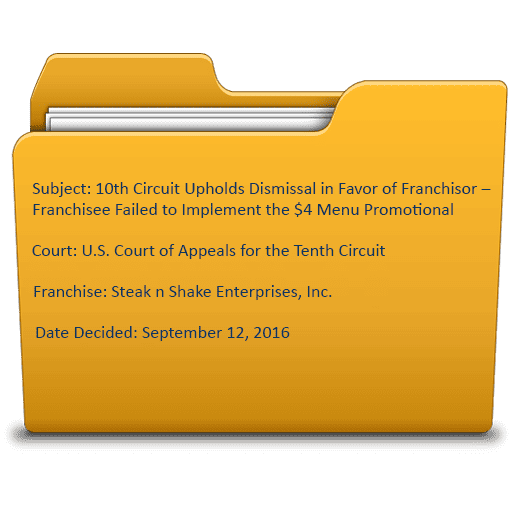
Upon executing the franchise agreement, the Franchisee was aware that the Franchisor would require mandatory promotions. In May 2013, the Franchisor rolled-out a “$4 Menu” promotion, which increased the number of meals priced under four dollars (prior to this promotion, there were only four meals under four dollars). Prior to the roll-out, the Franchisee had objected to menu price structure claiming that it was losing money. The Franchisor did not reply. Following the roll-out, the Franchisee again objected and stated that it was going to implement its own price structure based on an á la carte selection. Again, the Franchisor did not reply. The Franchisee followed-through with its threat and employed its own menu, rather than the Franchisor’s menu, and further, its drive-through charged more for regular-sized drinks.
The Franchisor served a default notice on June 18, 2013 and gave the Franchisee a time frame to cure the breach and comply with the approved menu. On June 21st a Franchisor agent visited Franchisee’s two Colorado restaurants and found that they still failed to comply by offering the proper menu. On July 3rd, the Franchisor terminated the franchise and license agreements, and subsequently filed suit in the Federal District Court.
Following the discovery period, the Franchisor filed a motion seeking summary judgment arguing that judgment was appropriate, as “no reasonable mind could dispute that the Franchisee knowingly failed to offer a mandatory promotion.” The District Court ruled in the Franchisor’s favor. The Court of Appeals upheld the District Court (note, no oral argument was heard – decided on the papers). The Court noted that the evidence proved that the Franchisee’s acts were intentional. Although the Franchisee would honor the $4 Meal if requested by the customer, the promotion was not properly noticed as required by the Franchisor. In fact, the plaintiff proved that in a four day period, only three $4 Meal sales were sold at the Franchisee’s restaurants. During the same period of time, fifty-four $4 Meals were sold at corporate-owned restaurants. Additionally, a Franchisee restaurant manager testified that he removed all material in the restaurant having to do with the promotion, including the marketing material. Further, the kitchen staff was directed to prepare á la carte meals, rather than the combination meals, per the promotion. The Franchisee’s á la carte meals were charged at $5.08, rather than $3.99.
The Court ruled that the franchise termination was proper under the terms of the FA.
Citation: 2016 U.S. App. LEXIS 16650
BE ADVISED that these comments are not intended as legal opinions and are not to be relied upon as legal advice. If you need legal advice please contact us to discuss the specifics of your franchise business.
© KilcommonsLaw, P.C. 2016
ARE YOU LOOKING FOR A FRANCHISE LAW ATTORNEY IN NEW JERSEY?
